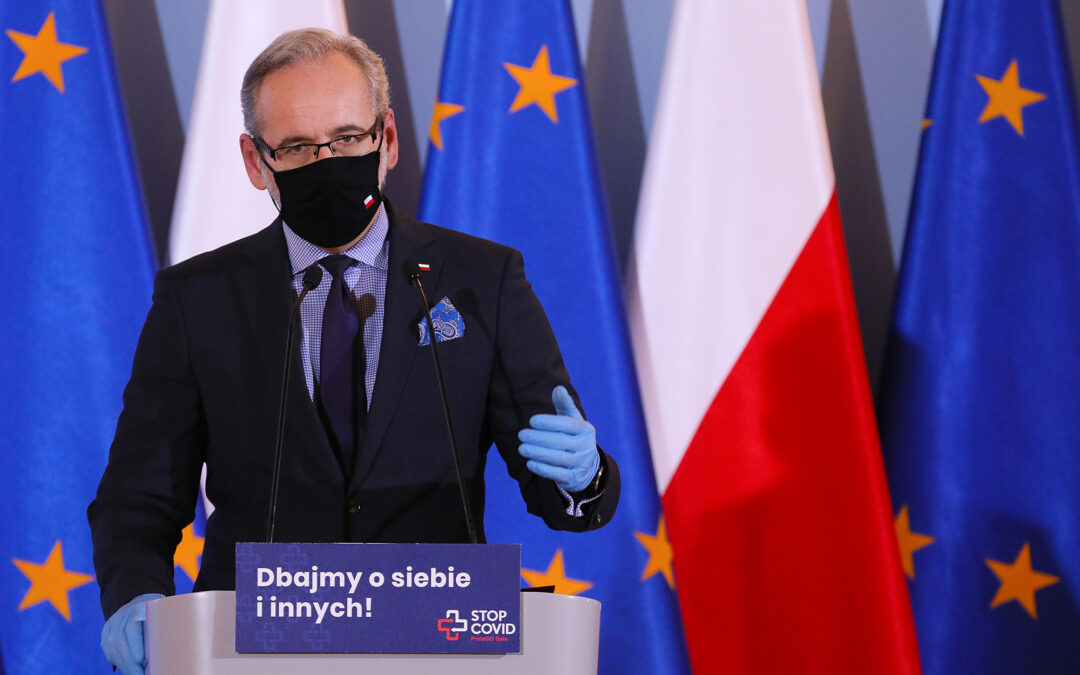The Polish government is seeking to attract over 1,000 doctors from abroad, mostly from Ukraine and Belarus, to bolster its strained healthcare system. Poland today again recorded its highest ever daily numbers of new coronavirus cases and deaths.
Meanwhile, the health minister has also announced that medical staff already tackling the pandemic will have their salaries doubled.
“We want to encourage foreign doctors to work [here],” said Sławomir Gadomski, a deputy minister of health, speaking to Dziennik Gazeta Prawna. He told the newspaper that the target number was over 1,000.
While the ministry is “open to all doctors”, said Gadomski, it is most likely that Belarusian and Ukrainian ones will answer the call “because of the smaller language barrier”.
“Many doctors are already in the process of obtaining recognition of their diplomas” in Poland, added the minister, who noted that emergency medicine specialists and anaesthesiologists are most needed.
The ruling Law and Justice (PiS) party is currently seeking to pass legislation that would make it quicker and easier for doctors from outside the European Union to have their qualifications recognised in Poland and begin work.
Ukrainians and Belarusians are already Poland’s largest two immigrant groups. Their numbers have risen rapidly in recent years as Poland experiences levels of immigration unprecedented in its history and among the highest in the European Union.
As Poland’s healthcare system has been strained by record numbers of COVID-19 cases, many doctors and other health experts have noted that the main problem is not a lack of equipment or space, but of qualified medical staff. The government has claimed that some medics are unwilling to tackle the pandemic.
However, that message has now changed, with the prime minister, Mateusz Morawiecki, saying on Sunday that the government would support medical staff “in a special way, also financially” adding that “nobody deserves it more than they do”.
On the same day, the health minister, Adam Niedzielski, said that he has asked the National Health Fund (NFZ), which funds Poland’s public health system, to double the salaries of “medical staff fighting against COVID-19”. He said the pay rise was a way to show appreciation for those on the front line.
Aby przeciąć wszystkie spekulacje zdecydowałem się nie czekać na wejście w życie ustawy i wydałem już dziś polecenie gwarantujące wypłatę podwójnego wynagrodzenia dla pracowników medycznych walczących z covid-19. Grupa beneficjentów została poszerzona o ratowników i diagnostów. https://t.co/5hckhdAAjU
— Adam Niedzielski (@a_niedzielski) November 1, 2020
Asked about the costs of offering “incentives” for doctors to fight the pandemic, Gadomski told Dziennik Gazeta Prawna that it was estimated at around 100 million zloty (€22 million) per month. However, he noted that with rising numbers of Covid cases, costs would also continue to go up.
The health ministry has also enlisted the help of private facilities, with 18 private hospitals agreeing to supply the public health system with an additional 1,000 beds along with medical staff to tend to them.
Poland today again recorded its highest ever daily figures for new coronavirus cases (24,692) and deaths (373). At the start of this week, it had the fourth highest number of COVID-19 deaths (in proportion to population) in the EU over the last seven days.
Two weeks ago the government announced that it would turn Warsaw’s national stadium – Poland’s biggest arena – into a temporary hospital with 500 beds. It has also tasked six large state-owned companies with helping to build emergency hospitals elsewhere in the country.
Given that a lack of staff, rather than equipment, is widely cited by doctors and experts as the main problem, some have argued that creating new emergency hospitals will not resolve – and could even exacerbate – the situation.
Warsaw’s opposition mayor, Rafał Trzaskowski, has said that attempts by the new National Stadium hospital to poach staff from other facilities in the capital with offers of higher pay are disrupting the existing health system.
Main image credit: Krystian Maj/KPRM (under CC BY-NC-ND 2.0)

Maria Wilczek is deputy editor of Notes from Poland. She is a regular writer for The Times, The Economist and Al Jazeera English, and has also featured in Foreign Policy, Politico Europe, The Spectator and Gazeta Wyborcza.




















